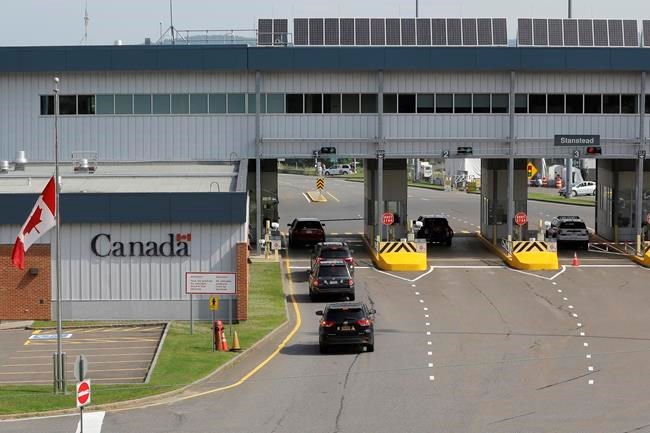OTTAWA — Monday's reopening of the Canada-U.S. land border is sparking a mixed reaction among Canadian business leaders: They're excited that people and not just goods will be crossing the border again but are wary of remaining red tape.
The Canadian Chamber of Commerce and the Business Council of Canada say the Canadian requirement for returning travellers to provide a recent, negative molecular test is an unnecessary obstacle to kick-starting business travel and tourism.
They say proof of vaccination is all that should be needed and the test requirement should be scrapped.
They argue that the continued testing requirement is too cumbersome for Canadian business travellers wanting a quick visit to an American destination, and too expensive for families who want a vacation or reunion with loved ones.
"If we believe, as we should, that being fully vaccinated is the best way of minimizing risk, we should be trusting the vaccination systems. We should be monitoring what's taking place in terms of outbreaks in the two countries," chamber president Perrin Beatty said in an interview.
"It's a competitive disadvantage to Canada and North America to have rules that are inconsistent with where most of the world is moving to," said Goldy Hyder, the president of the Business Council of Canada.
While the U.S. will not require travellers to show a negative COVID-19 test, the Canadian government is not waiving that requirement for citizens and permanent residents when they enter Canada.
That means that when the land border opens for the first time to non-essential travellers since March 2020, it will not be accompanied by an end to a negative COVID-19 test requirement for Canadian travellers.
Beatty said the response to the 9/11 terrorist attacks in the United States 20 years ago offers the government a good lesson in risk management.
After the attacks on the Twin Towers in New York City and the Pentagon, the Canada-U.S. border was slammed shut. It quickly reopened because both governments realized that trade and the flow of goods and people across the border all needed to resume, but with tighter security measures in place.
Canada and the U.S. realized they couldn't stamp out terrorism, so they "adopted a risk management approach that said, 'What we will do is we'll focus on the areas of highest risk. We'll use intelligence,'" said Beatty.
"But the government treated COVID in a very different way, one that was unco-ordinated, and one that wasn't based on risk management."
Meredith Lilly, the Simon Reisman Chair in trade policy at Carleton University's Norman Paterson School of International Affairs, said it might be some time before the impact of border closures and various lockdowns will be known on a key aspect of international trade – labour mobility.
"We have all just been subjected to the world's largest experiment in digitalization. Many of us have been forced to learn how to operate in the digital environment and not travel to do work that once required us to be in person," said Lilly.
"I don't know that we yet fully understand the consequences of … whether that is going to impact the liberalization of labour mobility, where people were mega-commuting and where we saw labour mobility as kind of a big, important part of 21st-century globalized trade."
Lilly said the aftermath of the 9/11 attacks and the new border security and anti-terrorism measures that followed could prove instructive in the years ahead.
For example, she said day trips between the two countries dropped dramatically, the result of what became known as "the unfriendly border phenomenon in which travellers opt to forgo trips out of reluctance to face heightened scrutiny.
The expense and inconvenience of getting a PCR test could prove discouraging. That could have a damaging effect on tourism, leading to a decline in shorter, more spontaneous trips, said Lilly.
Larger companies might be able to absorb the cost of tests, but smaller businesses might not be able to shoulder them, she added.
Hyder said the government needs to have more faith in the ability of vaccines to stop the spread of COVID-19 or at least weaken its impact on people who might contract it.
"We have to have a new approach to the way we manage risk and we see risk. And I think Canadians should be rewarded with their compliance on the vaccines," said Hyder.
"If the only people moving around are fully vaccinated people, it is time that we trust the vaccine, and we recognize that the endemic nature of this means we have to coexist with this."
Brian Kingston, the president of the Canadian Vehicle Manufacturers Association, said the auto industry is ready to take advantage of whatever new flexibility unrestricted land travel will allow, given that the integrated industry and its supply chain straddles the Canada-U.S. border.
"We saw continued movement of parts and finished vehicles throughout the pandemic, which is all very positive. However, we have had challenges with the movement of personnel," said Kingston, citing engineers and researchers.
"There have been challenges with respect to the rules around the border, in particular the definition of what is an essential worker and the exemptions that were provided."
While travelling by plane was always an option, the fact that so much of the industry is clustered around the Windsor-Detroit border meant that simply created planning headaches while generating extra expense, he said.
"Something comes up. You have to visit a facility, or fix a piece of machinery. It was just an extra burden to have to go to an airport and fly into the U.S.," said Kingston.
"Having that in the rear-view mirror – it's great."
This report by The Canadian Press was first published Nov. 6, 2021.
Mike Blanchfield, The Canadian Press




